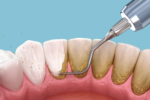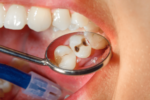Your oral health and general well-being are strongly impacted by the choice you make between dental bridges and dental implants near you for tooth replacement. You need to choose wisely and in accordance with your unique demands and objectives by being aware of the advantages and factors to be taken into account for each alternative.
Making the proper decision upfront will save you time, money, and potential problems down the road. In the end, you can make an informed choice that best meets your particular oral health needs and intended goals by learning the features and advantages of dental implants and bridges.
What are Dental Implants?
A common and efficient tooth replacement alternative is dental implants in Edmonton. To act as fake tooth roots, tiny titanium posts are surgically inserted into the jawbone. These implants offer a sturdy base for the affixing of dental crowns, bridges, or dentures, resulting in a solid and realistic-looking tooth replacement. Getting dental implants often requires several stages. The implant is first surgically implanted into the jawbone, where it undergoes a process known as osseointegration, in which it combines with the surrounding bone. The new tooth has a stable and reliable foundation thanks to its integration. An abutment is affixed to the implant once the jawbone has completely bonded with it. The fake tooth and the implant are connected through the abutment. It extends over the gum line, making it possible to attach a denture, bridge, or dental crown.What are Dental Bridges?
When one or more teeth are missing, a frequent and reliable tooth replacement option is a dental bridge in Edmonton. A dental bridge is composed of one or more pontics, or artificial teeth, that are held in place by dental crowns that are bonded to the adjacent healthy natural teeth or dental implants. Getting a dental bridge normally entails a number of processes. To prepare the teeth on each side of the gap for the dental crowns, a little amount of enamel is first removed from each tooth. Then, imprints of the teeth are produced to make a bridge that is specifically built to fit over your natural teeth. The dental bridge is positioned and properly aligned at a second appointment. The gap left by the missing teeth is subsequently successfully closed by the bridge, which is permanently bonded or cemented into place.Considerations to Make While Deciding Between Dental Bridges and Implants
There are a number of crucial factors to take into account while picking between dental bridges and implants for tooth replacement. You can consider the factors that follow to help inform your decision-making and guarantee that you select the solution that best meets your needs:- Oral Health: The condition of your oral health plays a crucial role in determining the suitability of dental bridges or implants. Dental implants require a certain amount of healthy jawbone and gum tissue for successful placement. If you have insufficient bone or gum tissue, bone grafting or other procedures may be necessary to support dental implants. On the other hand, dental bridges rely on adjacent teeth or implants for support, so the health and stability of those teeth or implants are essential.
- Longevity: Dental implants are generally considered a more long-term solution compared to bridges. With proper care and maintenance, dental implants can last for several decades, whereas dental bridges typically have a lifespan of around 10 to 15 years. If long-term durability is a priority for you, dental implants may be your preferred option.
- Aesthetics: Both dental implants and bridges can provide aesthetically pleasing results, but dental implants often offer a more natural appearance. Implants are individually placed in the jawbone, mimicking the look and feel of natural teeth. Bridges, on the other hand, rely on dental crowns and pontics, which may not be as seamlessly integrated with the surrounding teeth.
- Treatment Timeline: Dental implants typically require a longer treatment timeline compared to bridges. Implant placement involves a surgical procedure and requires time for osseointegration, where the implant fuses with the jawbone. In contrast, bridges can be fabricated and placed more quickly since they do not involve surgery or osseointegration.
- Cost: Dental implants tend to be more expensive upfront compared to bridges. The complexity of the implant procedure and the need for additional treatments, such as bone grafting, can contribute to higher costs. Dental bridges, while generally more affordable, may require replacement or maintenance over time, which can incur additional expenses.
- Personal Preference: Your personal preferences and comfort should also be considered. Some individuals may prefer the stability and permanence of dental implants, while others may feel more comfortable with the concept of dental bridges. It is essential to talk to a dentist near you before you make a decision.








